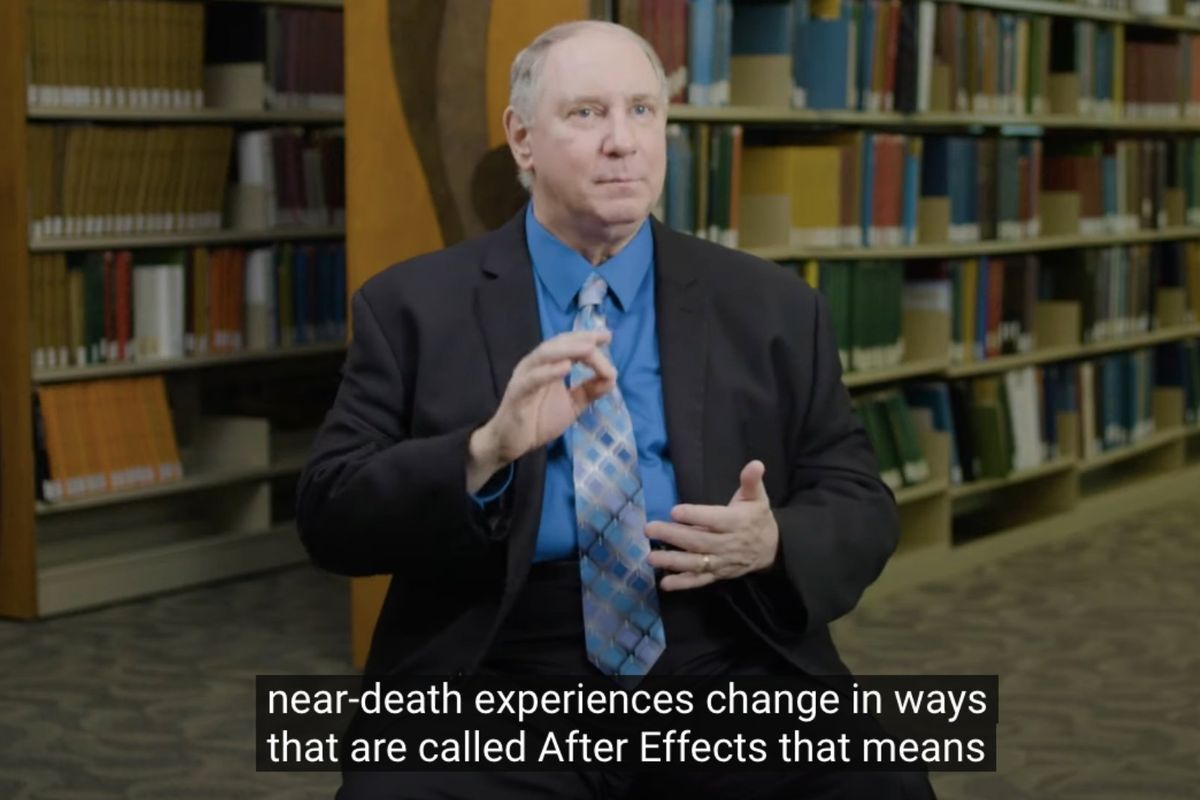Oncologist shares how studying 5,000+ near-death experiences convinced him of an afterlife
"There isn't even a remotely plausible physical explanation for this phenomenon."

Dr. Jeffrey Long explains his study of near-death experiences.
What happens when we die? What, if anything, comes next? When our body goes kaput, is that it? Are we done? Or is there another part of us—a consciousness, a spirit, a soul—that lives on in some other form or plane of existence?
These are questions that humans have asked since time immemorial, and no one knows the answers for sure. We may have spiritual or philosophical or religious beliefs about life after death, but they are just that—beliefs. Scientifically speaking, we can't prove what happens to our inner self when we die.
But that hasn't stopped one doctor from studying the closest phenomenon we have to death itself—the near-death experience.
Near-death experiences, or NDEs, occur when a person's heart stops beating, they are considered clinically dead, and then they are revived. What the person sees, hears and experiences in that near-death space has been a fascination for Dr. Jeffrey Long since he first read about them over three decades ago as an oncologist resident. Intrigued but skeptical, Long decided to study near-death experiences with the mind of a scientist—a study that has led him to believe in an afterlife based on "overwhelming evidence."
Long, now a radiation oncologist, founded the Near-Death Experience Research Foundation, where he and his wife collect and evaluate people's NDEs. They currently have the world's largest database of publicly available NDE cases and he shared some insights he's gained in studying over 5,000 cases in an as-told-to essay in Insider.
Long explained that while no two NDEs are the same, he noted "a consistent pattern of events emerging in a predictable order." Nearly half of people with an NDE report having an "out of body" experience in which their consciousness separates from their body. (This is the classic image of someone seeing themselves in a hospital bed as if hovering above it.) In some of these instances, people describe things they should not have been able to see in their comatose or clinically dead state.
Next comes the somewhat cliché images—a tunnel, a bright light, loved ones waiting in a peaceful place. Long said, "I've come to believe that these descriptions have become cultural tropes because they're true. I even worked with a group of children under five who had NDEs. They reported the same experiences that adults did—and at that age, you're unlikely to have heard about bright lights or tunnels after you die."
Long also described how some people have been able to describe things that happened away from where their bodies were during a NDE, with witnesses confirming what they say they saw.
"I'm a medical doctor. I've read brain research and considered every possible explanation for NDEs. The bottom line is that none of them hold water. There isn't even a remotely plausible physical explanation for this phenomenon," he said.
Long's study of NDEs has led him to believe "certainly" that there is some kind of an afterlife. In fact, he even wrote a book called "Evidence of the Afterlife: The Science of Near-Death Experiences," which became a New York Times Bestseller.
But as much as studying NDEs has made Long into a believer in life after death, the impact its had on his work as an oncologist is just as profound.
"I don't tell my patients about my NDE research. And yet, my work with NDEs has made me a more compassionate and loving doctor," he said. " I'm able to help my patients face life-threatening diseases with increased courage and passion. My goal is to help them have more healthy days here on Earth. But I firmly believe that if and when they pass, they will be at peace."
Dr. Long shared in the documentary "Hidden Beyond the Veil" that his study of thousands of NDEs has removed all fear he has of death.
"I, like the thousands of near-death experiencers that I've investigated, have come to that same conclusion—we're literally spiritual beings having an earthly existence at this time," he said. "When we die—and we all will—then we're going to return to our real home, that spiritual home, which is so often, and I think aptly, called heaven. And that is going to be an absolutely wonderful existence for each and every one of us."
Watch him share what he has learned through studying NDEs:
- A 'death box' may sound morbid, but it's actually a priceless gift for your loved ones ›
- The 3 things you learn after your mother dies. ›
- People are sharing what they believe happens after we die. The responses are enlightening. ›
- Jeremy Renner gives poignant reason he was 'pissed off' to be 'brought back' after snowplow accident - Upworthy ›
- Hospice nurse says 'shared death experience' convinced her of afterlife - Upworthy ›
- 70 percent of those who have a near-death experience become spiritual - Upworthy ›









 Many people make bucket lists of things they want in life.
Many people make bucket lists of things they want in life. 

 sipping modern family GIF
sipping modern family GIF 
 Thomas Jefferson's Monticello.via
Thomas Jefferson's Monticello.via  The Jefferson Memorial in Washington, D.C.via Joe Ravi/Wikimedia Commons
The Jefferson Memorial in Washington, D.C.via Joe Ravi/Wikimedia Commons
 The 1992 Olympics were held in Barcelona. Photo by
The 1992 Olympics were held in Barcelona. Photo by